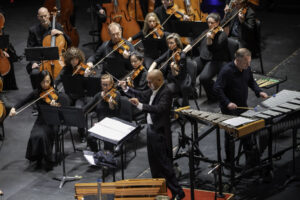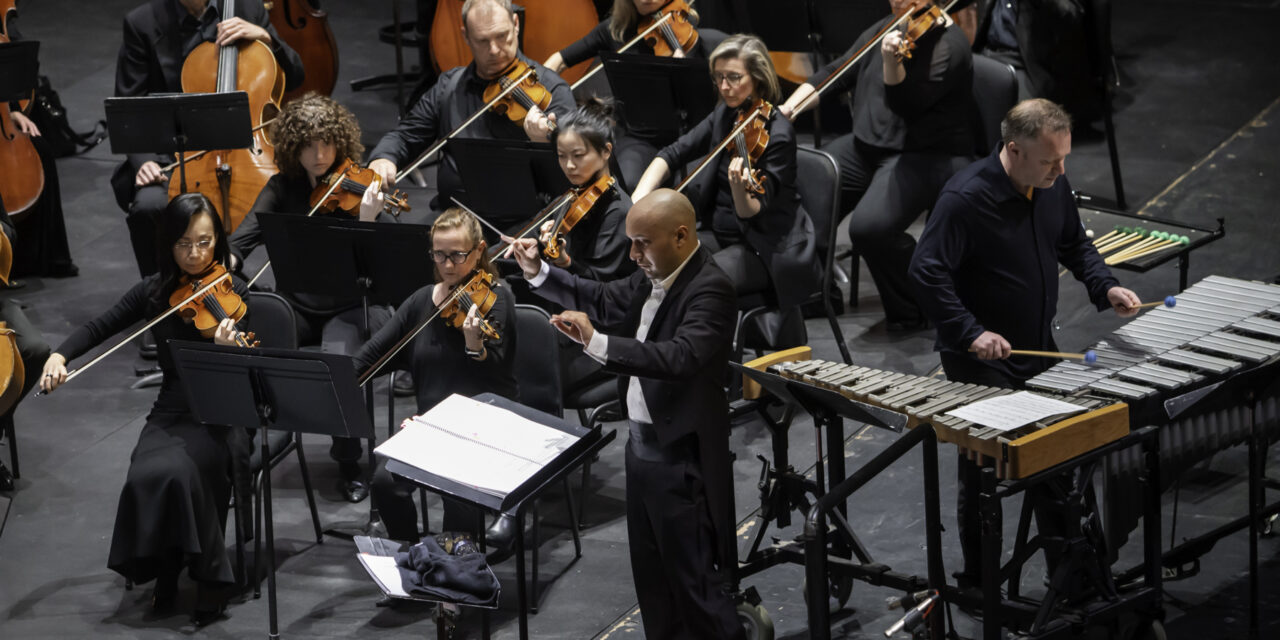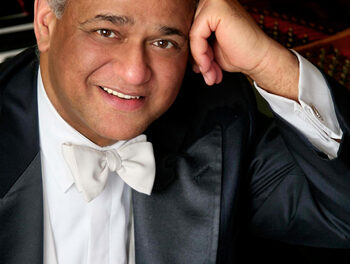 GREENSBORO, NC – Christopher Dragon, the current Music Director of the Wyoming Symphony and Resident Conductor of the Colorado Symphony, led the Greensboro Symphony Orchestra in works from the 20th and 21st centuries. He is the fifth conductor seeking the Music Director position for the GSO in this “Season of Seven.”
GREENSBORO, NC – Christopher Dragon, the current Music Director of the Wyoming Symphony and Resident Conductor of the Colorado Symphony, led the Greensboro Symphony Orchestra in works from the 20th and 21st centuries. He is the fifth conductor seeking the Music Director position for the GSO in this “Season of Seven.”
The evening opened with the nine-minute Theme and Variations, Op. 42 (1953) by Erich Wolfgang Korngold (Moravia, present-day Czech Republic, 1897-1957); it was the last original composition he completed before his death. Korngold is known as one of most influential composers of music for Hollywood films such as The Adventures of Robin Hood (starring Errol Flynn and Olivia de Havilland) although he is also well-known as a composer of “classical” music.
The opening gentle ingratiating theme, which the composer stated should be played “like an Irish folk song,” is followed by seven variations, most delineated by a pause or change in orchestration. The music reflected in turns agitation, syncopation, sighing motives, impish character, and most of all a finale that (dare I say it?) exhibited a lot of swashbuckling. Dragon’s conducting was animated, energetic, precise, and perhaps a bit quirky; the result was a fine presentation of a seldom-heard work.
Perhaps the high point of the evening was the Percussion Concerto written by Danny Elfman (U.S., 1953) for percussionist Colin Currie, Saturday night’s guest artist. The work was jointly commissioned by the London Philharmonic Orchestra and Soka Performing Arts Center at Soka University (CA). It was premiered by the London Phil less than two years ago. Currie is currently showcasing the piece; he has a half dozen more performances of the work lined up this month.
According to the composer, “Percussion has always been my first love in the musical world. . . but taking it to the level of a full concerto with Colin was another thing altogether. A huge challenge.” The piece is divided into four sections: “Triangle” (with three percussionist groups including the soloist representing the three points), “DSCH” (derived from composer Dmitri Shostakovich’s name), “Down”–“the most harmonically adventurous movement” (according to the program notes by Kira Gaillard), and the finale “Syncopate,” which the composer describes as “fast, . . . exciting, . . . fireworks, . . . a roof-raiser.”
Wow! One can’t adequately explain the virtuosity of performer Currie. His facility was impeccable, playing on snare drums, xylophone, marimba, vibraphone, Chinese opera gong, talking drum and many other things including a metal ‘gizmo.’ One must also mention the fine playing of other percussionists in the GSO: Wiley Arnold Sykes, John R. Beck, Isaac Pyatt, Gilson Fearnow, and timpanist Peter Zlotnick. Fine and precise conducting (with a close eye on Currie) by Dragon kept the forces together.
To be sure, the work is not just about flash, although there is plenty of that. Through the course of the 30-minute work are wonderful, lovely tunes, eerie/creepy moments, as well as fragility. One must also point out the solid and brilliant keyboard (piano and celeste) playing of Robert Rocco and Chris Heckman, respectively.
Dragon engaged the audience a couple of times during the performance and explained the background of each composition. This included the storyline of the final work on the program, the 1945 orchestral arrangement of the ballet The Firebird first presented in Paris in 1910. The composer was Igor Stravinsky (Russia, 1882-1971), who became an overnight sensation with the performance; it was his first masterpiece in a long and influential career.
The piece contains magnificent orchestral writing, a trademark of Stravinsky’s ballets. The composer utilized a seemingly unending palette of colors available from the large orchestra: important solos (too numerous to single out) from the strings, winds, and brass as well as harp (flawlessly played by Helen Rifas) to interesting instrumental combinations that frequently led to full orchestral climaxes.
Dragon authoritatively took the magnificent Final Hymn at a fitting solemn yet free tempo, and his build up to the ending was well-paced, although he took more liberty than most with the measures immediately before the cataclysmic cymbal crash leading into the glorious brass chord progression. The audience was thrilled by the overall performance and the great evening of wonderful music.












